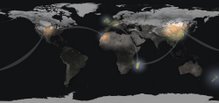My friend Richard and I sometimes toss around a saying that is like an inside joke. We'll call some place the 'Center of the Universe,' which is a kind of anecdotal way of saying it's the middle of the best story of the moment, the anchor point of some ephemeral and relative cosmology. Maybe an unusual proportion of my friends think in terms of maps.
Lots of places have been the Center of the Universe. Notably Williams Island, Moturata, Smaills, Morgan's Steep, Cumberland Island, The Confluence of the Green and Colorado Rivers, Hovenweep, The Fiery Furnace, the list goes on. Being there was the important part - and not only that, but fully being there in a way that centers our confusing networked experiences of places and times into a coherent story with a definite origin, at least for a moment. Sometimes there's a picture to go with it.
Rebecca Solnit finishes out River of Shadows by questioning not just the nature of frozen photographic time and motion pictures, but of all informational representation and its place in our lives. Seems like an old question, but her work gives it new light. It's a good book.
"...The premise of the efficiency and convenience of every technology is that it will save time, though as Stanford himself remarked, "if you could limit man's wants it might be called 'labor saving,' but as there are no limits to his wants, the machinery really increases the power of production." That production is now dematerialized too. Because machines streamline the production of material goods from apples to automobiles, more and more first-world labor is concentrated in the production and management of information, the virtual substance running through all those satellites and cables.
The Modoc center of the world was the center of a world just a few hundred miles across, and just as the world once had an infinite number of local times, so it had countless centers - what we mean by a world rather than the world. ...
California is the center of the contemporary world, but of a world in which time and space have been annihilated, a world that is in some obscure way so disembodied, dislocated and dematerialized that the very idea of a center is perplexing. ...
...his grandfather in the same town had moved at a predictable pace through a world in which human beings and their voices and knowledge were no faster than the animals and water and wind that surrounded them. There are infinite ways to measure what has been gained and what has been lost, and only one clear thing: the world is utterly changed. "
Strange to saddle up now and head into the office for another day of tweaking picture signals.
Subscribe to:
Post Comments (Atom)


nice summation luke... you too, are quite the philosopher
ReplyDelete